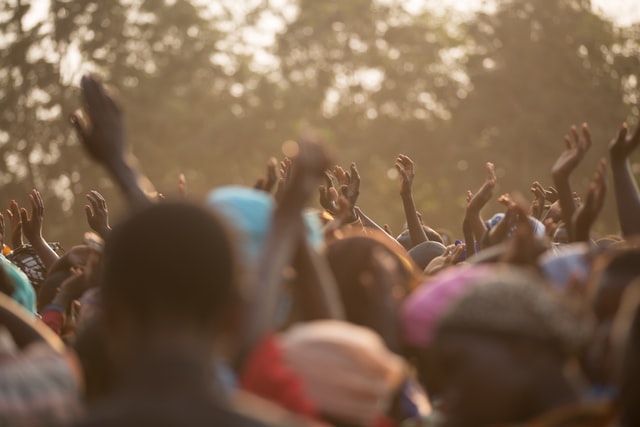Photo by Avel Chuklanov on Unsplash
President Hage Geingob’s claims on Africa Day are far from the reality about the state of peace, democracy and freedom on the continent.
Towards the end of a widely publicised statement on Africa Day, on 25 May 2020, Namibian president Hage Geingob stated:
“We truly have much have much to celebrate as Africans. In 57 years, we have achieved what some have thought would be impossible, a free, democratic Africa, a self-governing Africa, and most importantly, an Africa without incessant civil wars and unrest, focused on the wellbeing of its citizens.”
– President Hage Geingob
The Geingob statement gave a historical overview of the combined 57 years of existence of the Organisation of African Unity (OAU) and African Union (AU), which replaced the OAU in 2002, and aside from being widely disseminated in Namibia, president Geingob’s statement was reported on in other parts of the continent as well. See here, here and here, for instance.
The above quoted segment of the president’s statement contains three contentious claims, specifically:
- That Africa or Africans are free;
- That African countries are democratic; and
- That Africa is without civil wars and unrest.
Namibia Fact Check has assessed the accuracy of these claims.
Africa or Africans are free
While it is certainly true that Africa is free from external (as in Western) imperialism and colonialism, it certainly isn’t the case that all Africans are free from foreign domination, as the Western Sahara case exemplifies.
Western Sahara is a disputed territory that is claimed and governed by Morocco. However, Namibia and other African states have expressed support for Western Sahara to gain independence from Morocco. In fact, in March 2019 Namibia was a co-host, along with South Africa, of a Solidarity Conference with the Saharawi people, which called for the end of Moroccan colonial rule of the territory.
As for the general state of political freedom – exercising political rights and civil liberties – on the continent, according to Freedom House’s Freedom in the World 2020 Index:
- 22 countries are scored as not free;
- 24 countries are scored as partly free; and
- Only 7 countries are considered free (Namibia is one).
Based on all this, Namibia Fact Check rates the Geingob claim that Africa is free as mostly false.
African countries are democratic
As for the state of democracy on the continent, according to the influential Democracy Index 2019 of the Economist Intelligence Unit (EIU):
- Only 1 African country is rated a full democracy (Mauritius);
- 6 countries (including Namibia) are considered flawed democracies;
- 15 countries are classified as hybrid regimes; and
- 22 countries are considered authoritarian states.
The Democracy Index scores countries on electoral processes and pluralism, functioning of government, political participation, political culture and civil liberties. The latest Democracy Index only rated 44 African countries.
Using the Democracy Index as a guide, Namibia Fact Check rates the Geingob claim that Africa is democratic as mostly false.
Africa is without civil wars and unrest
The basic fact is that, in 57 years Africa has not been free of war and violent unrest.
In 2013, African leaders made a pledge of silencing the guns by 2020, but in August 2019 the Institute for Security Studies (ISS), a paper titled ‘Reality check: Africa’s bid to silence the guns‘, wrote:
“After just six years of the whole initiative and barely three of the roadmap, it’s no surprise that Africa remains far from silencing all or even most of the guns. Some successes in peace efforts have been registered, such as the Ethiopia-Eritrea peace accord, the Sudan peace deal, the revitalised South Sudan peace deal, the mediations in Madagascar and Central African Republic – although many remain tentative.”
– ISS
The paper continues:
“However the Uppsala Conflict Data Program, the most comprehensive global monitor of conflicts, shows that despite some fluctuations either way, the 2018 death toll from organised violence in Africa barely changed from that of 2013. It was 15 455 in 2013, jumped steeply to 24 264 in 2014, dropped to 20 515 in 2015, dropped again to 17 416 in 2016, rose to 18 308 in 2017, then dropped to 15 003 in 2018.”
– ISS
And as Namibia Fact Check stated in a post on Africa Day 2020:
“Despite the commitment to ‘Silencing the Guns by 2020’ there are a number of armed conflicts raging on the continent as it marks Africa Day 2020, from an unending civil war in Libya to jihadist insurrections across West Africa and the Sahel, and Islamic State (IS) inspired insurgencies in Somalia and Mozambique, to name but some.”
In another August 2019 paper on ‘Silencing the guns beyond 2020‘, the ISS stated of the current war and unrest situation:
“The activities of violent extremists and other insurgent groups in the Sahel and the Lake Chad Basin, violence related to political transitions and the unprecedented level of climate change and natural disaster-induced displacement all pose a threat to states’ ability to keep their citizens safe. A number of countries also lapsed into violent conflict owing to weak state institutions or a lack of sustainable political settlements, such as in South Sudan, the Central African Republic, Mali and Libya.”
– ISS
Based on this, Namibia Fact Check rates the Geingob claim that Africa is without war and unrest as mostly false.

